Within centrifugal pump designs, diffuser pumps and volute pumps are two key types that engineers often evaluate. Both perform the same core task of converting kinetic energy from the impeller into pressure energy, but they achieve this through different casing designs, affecting efficiency, stability, and application suitability.
This guide provides a detailed comparison of diffuser pumps and volute pumps, highlighting how they work, where they are used, and the factors to consider before choosing one for your system.
Key Takeaways
- Diffuser pumps use stationary vanes around the impeller for smoother energy conversion, higher efficiency, and stable operation at high heads.
- Volute pumps use a spiral-shaped casing that simplifies construction, reduces cost, and suits low-to-medium head applications.
- Diffuser pumps are best for large industrial plants, power generation, and high-pressure systems.
- Volute pumps dominate general-purpose applications such as water supply, HVAC, and wastewater handling.
To choose effectively, it’s important to begin with the basics of diffuser pumps.
What Are Diffuser Pumps?
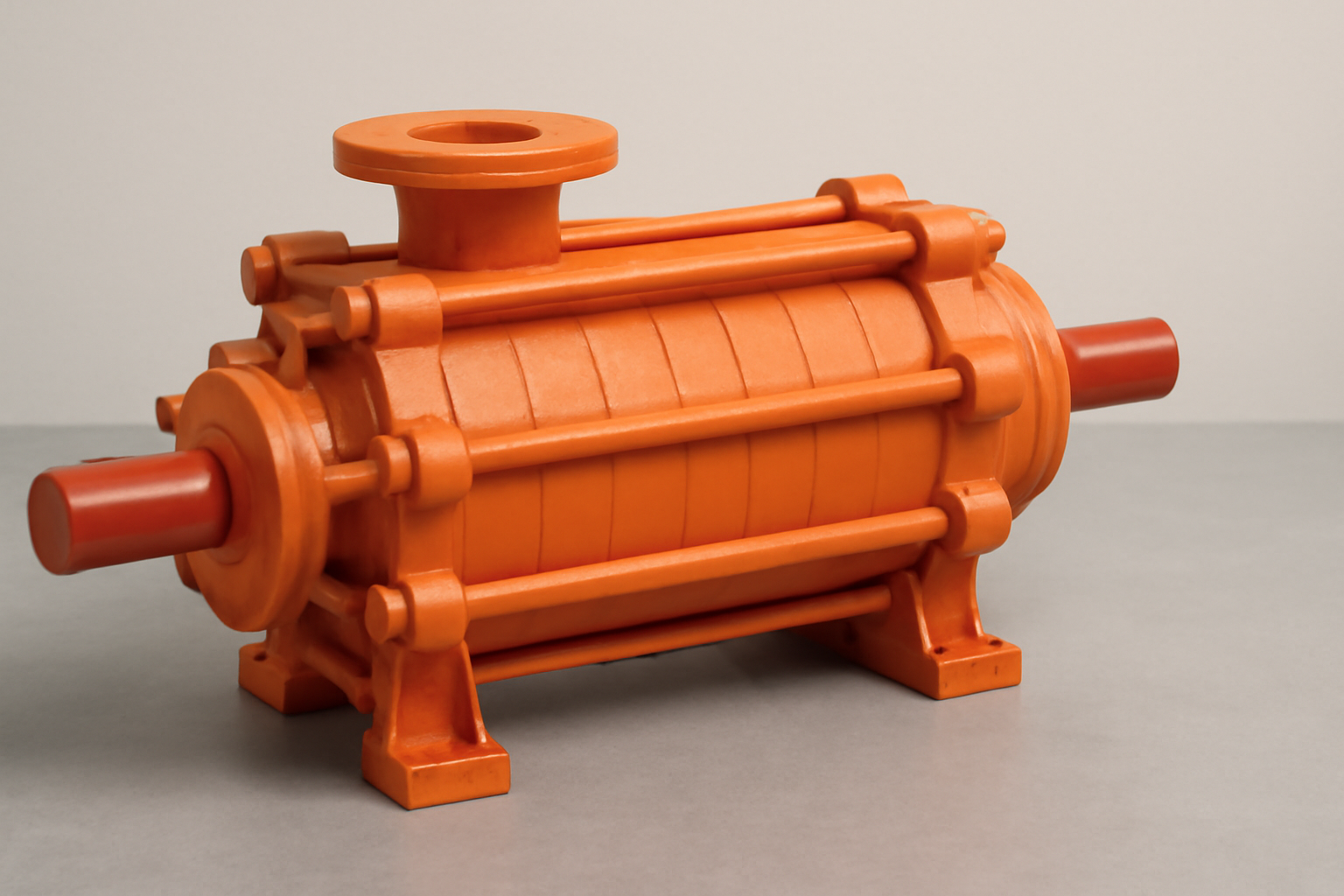
A diffuser pump is a type of centrifugal pump where fluid leaving the impeller passes through stationary diffuser vanes. These vanes guide the fluid and gradually convert its velocity into pressure, reducing turbulence and improving overall efficiency. Diffuser pumps are ideal for high-head applications where stable and smooth flow is essential.
How It Works:
- Flow Process: Fluid exits the impeller at high speed and enters the diffuser passages. The stationary vanes slow the fluid gradually, converting kinetic energy into pressure with minimal loss.
- Performance Stability: This controlled conversion maintains efficiency across a wide range of flow rates, ensuring consistent operation under varying load conditions.
Installation and Structural Overview:
Diffuser pumps are generally used where high-pressure delivery is required and the suction is stable.
- Diffuser Vanes: Radial or circular vanes around the impeller
- Impeller Design: Multi-stage, enclosed impellers (materials: SS316, bronze, or alloy steel)
- Bearings: Grease- or oil-lubricated rolling element bearings
- Seal Options: Mechanical seals or packed glands (single or double)
- Mounting Configuration: Close-coupled or frame-mounted
- Installation Setup: Typically installed below the fluid source; suitable for high-head operation
- Discharge Head Range: 50–1,500 meters, depending on stages and impeller size
- Efficiency: 85–90% at Best Efficiency Point (BEP)
Common Applications:
Diffuser pumps are best suited for industries and systems requiring high-pressure, reliable fluid movement:
- Boiler feed systems in thermal and nuclear power plants
- Desalination plants for high-pressure reverse osmosis
- Fuel, lubrication, and hydraulic systems in aviation
- Oil refinery process pumps
- Large-scale irrigation requiring high heads
Key Benefits:
- High hydraulic efficiency due to gradual energy conversion
- Stable performance over varying flow conditions
- Handles high heads efficiently without excessive energy loss
- Suitable for precise process control and consistent fluid delivery
Limitations:
- Less suitable for dirty or solid-laden fluids; risk of clogging between vanes
- Requires regular maintenance to prevent wear on internal components
When used in appropriate high-head applications, diffuser pumps provide efficient, stable, and reliable fluid handling for demanding industrial and utility systems.
What Are Volute Pumps?
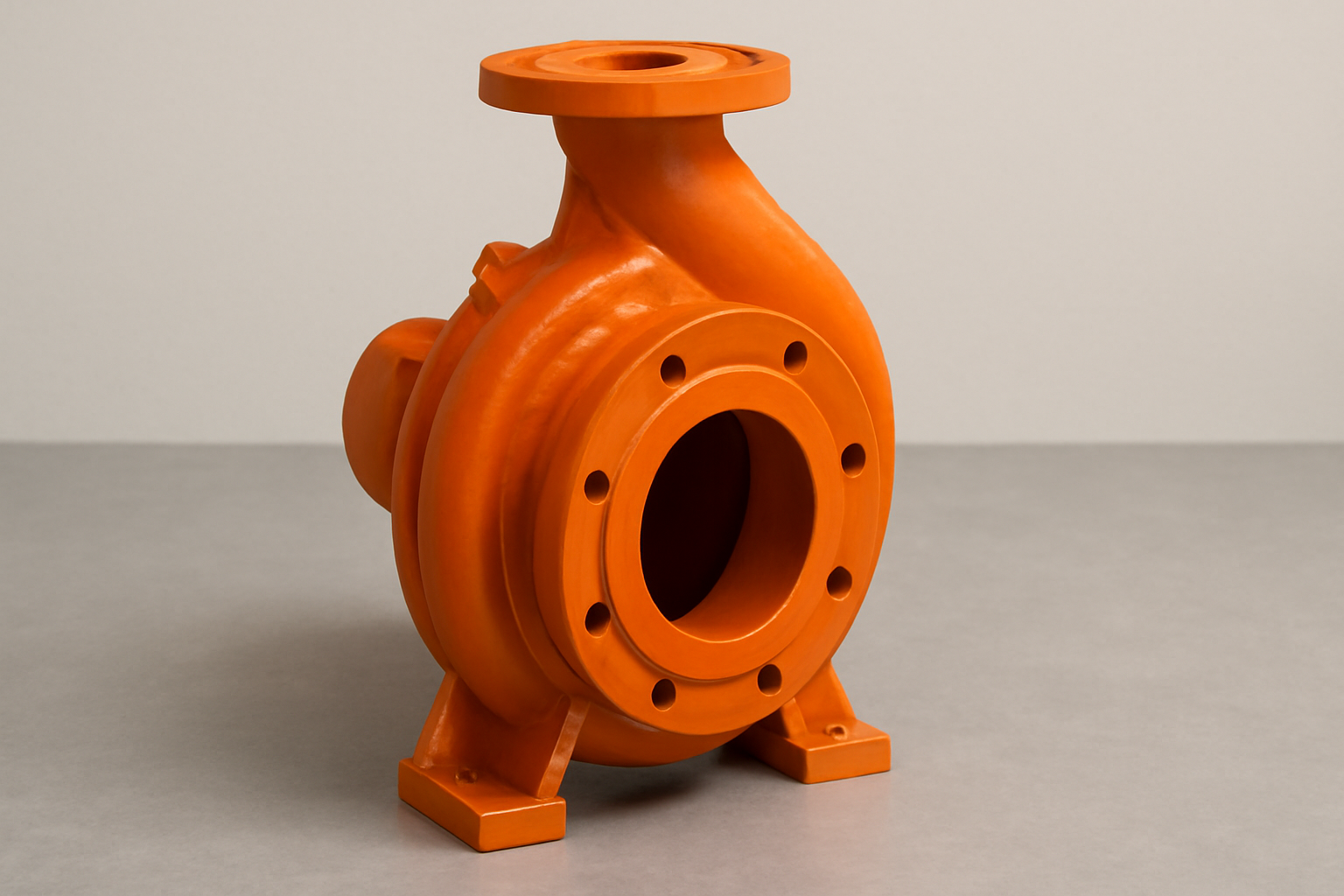
A volute pump is the most widely used centrifugal pump design, featuring a spiral-shaped casing (volute) that collects fluid from the impeller and converts velocity into pressure as the casing gradually expands. Volute pumps are known for their simplicity, cost-effectiveness, and versatility in a range of industrial and municipal applications.
How It Works:
- Flow Mechanism: Fluid exits the impeller at high velocity.
- Pressure Conversion: The volute casing gradually increases in cross-sectional area, slowing the fluid velocity and converting kinetic energy into pressure.
- Discharge: Pressurized fluid is directed to the discharge outlet for system delivery.
Structural and Performance Features:
- Casing Design: Spiral volute chamber that directs fluid smoothly from impeller to discharge.
- Impeller Type: Typically single-stage, available as enclosed, semi-open, or open impellers depending on fluid characteristics.
- Efficiency: 75–85%, slightly lower than diffuser pump designs due to less controlled velocity-to-pressure conversion.
- Head Range: Suitable for low to medium heads, generally up to 150–200 meters.
- Flow Stability: Performs best under steady, continuous flow conditions.
- Noise & Vibration: Can be higher, especially if operating away from design flow conditions or if misaligned.
Common Applications:
Volute pumps are versatile and widely used across industries, including:
- Municipal and industrial water supply systems
- HVAC circulation for chillers, cooling towers, and boilers
- Agricultural irrigation
- Wastewater treatment for raw water and effluent pumping
- Low-to-medium pressure chemical transfer in industrial processes
Advantages:
- Simple Construction: Easy to manufacture and maintain.
- Cost-Effective: Lower initial investment compared to complex pump designs.
- Compact Layout: Requires minimal space for installation.
- Ease of Maintenance: Standardized components and simple assembly allow quick repairs.
- Availability: Widely produced and readily available in multiple sizes and capacities.
Limitations & Considerations:
- Lower Efficiency: Slightly less efficient than diffuser pumps due to uncontrolled energy conversion.
- Off-Design Sensitivity: Performance drops if operating significantly away from best efficiency point (BEP).
- Vibration Risk: Uneven hydraulic forces may cause vibration and mechanical wear if not properly aligned.
Volute pumps provide a reliable and economical option for applications with moderate head and steady flow. Their simple design and easy maintenance make them ideal for general-purpose pumping needs.
Difference Between Diffuser Pumps and Volute Pumps
When selecting a centrifugal pump, understanding the differences between diffuser and volute designs is essential. Comparing key parameters such as efficiency, flow stability, and maintenance requirements can help identify which pump is more suitable for specific applications.
The table below summarizes their main characteristics:
Now that their features are reviewed, it’s time to compare diffuser pumps and volute pumps to determine which is better for your needs.
Diffuser Pumps vs. Volute Pumps: Which Is Better?
Pump selection is not just about initial cost or design preference. As an engineer or plant decision-maker, you need to consider factors like flow conditions, head requirements, efficiency, noise, and maintenance access.
Choosing between a diffuser pump and a volute pump depends on what aligns best with your system’s operational needs and long-term performance.
When to Choose a Diffuser Pump:
- High efficiency is critical for reducing energy costs and lifecycle expenses.
- The application requires a high or very high head, such as in boiler feed systems or desalination plants.
- Flow conditions fluctuate and maintaining stable performance is essential.
- Noise and vibration control are priorities, especially in sensitive industrial environments.
- Multi-stage or high-pressure systems where smooth energy conversion improves reliability.
When to Choose a Volute Pump:
- Cost-effectiveness and general-purpose functionality are more important than peak efficiency.
- Applications involve low-to-medium head and relatively steady flow conditions.
- Maintenance simplicity and easy access are key considerations.
- Systems handle clean water or light industrial fluids where solids are minimal.
- Quick installation or standardization across multiple sites is needed without complex engineering.
Evaluating pump options? Compare diffuser and volute pumps based on your head requirements, flow stability, and operational priorities to select the design that delivers reliability, efficiency, and long-term value for your plant. Find us here.
Chemitek: Helping You Select the Right Pump
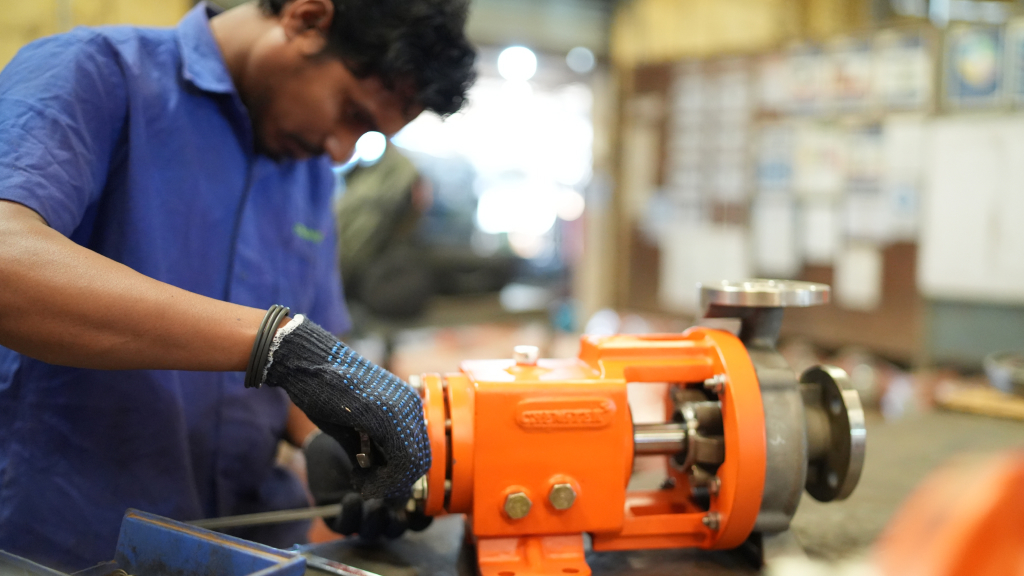
At Chemitek Process Equipment Pvt. Ltd., we supply both diffuser and volute centrifugal pumps designed for industrial performance. Our engineering experts assess flow requirements, NPSH, and efficiency targets to recommend the most suitable option.
From high-head diffuser pumps for power plants to compact volute pumps for water circulation, every Chemitek solution is built with durable materials like SS316, Hastelloy, and cast iron for reliability in demanding environments.
Planning a new project or system upgrade? Consult our team to match the right pump design with your operating conditions.
FAQs
1. Why do diffuser pumps provide higher efficiency than volute pumps?
Diffuser pumps gradually convert fluid velocity into pressure through stationary vanes, minimizing turbulence and energy loss. This smooth flow path improves hydraulic efficiency, particularly in high-head or multi-stage applications, compared to the simpler volute design.
2. Are volute pumps more cost-effective than diffuser pumps?
Yes. Volute pumps have a simpler construction, fewer components, and lower manufacturing costs. This makes them more affordable for general-purpose applications where extremely high efficiency or pressure isn’t critical.
3. Which pump is better for high-pressure boiler feed systems?
Diffuser pumps are ideal because they maintain stable performance under high heads and offer higher efficiency. Their smooth energy conversion reduces vibration and wear, making them reliable for continuous boiler feed operations.
4. Can diffuser pumps handle dirty or solids-laden fluids?
No. Diffuser passages are narrow, so solids or debris can clog the vanes. These pumps are best suited for clean fluids or filtered systems to maintain performance and prevent damage.
5. Which industries commonly use volute pumps?
Volute pumps are widely used in municipal water supply, HVAC circulation, agriculture, and wastewater treatment. Their simplicity, affordability, and ease of maintenance make them suitable for systems with steady flow and moderate pressure requirements.
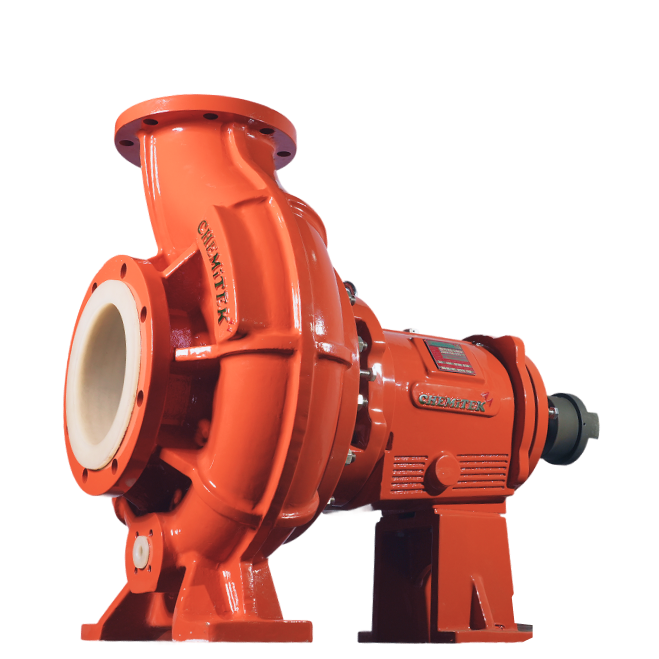
Latest posts
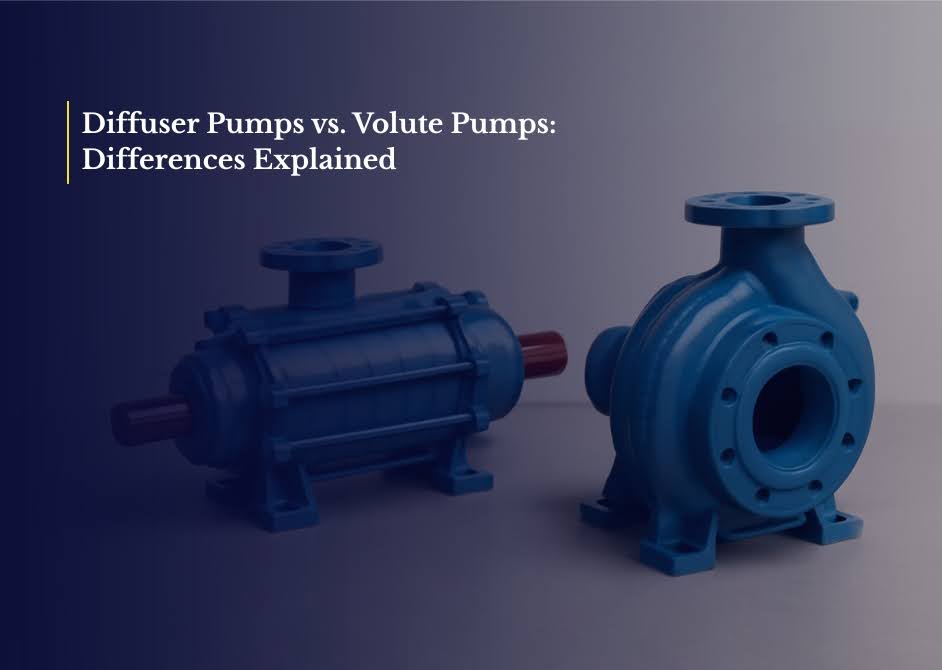
Diffuser Pumps vs. Volute Pumps: Differences Explained
Ready to Upgrade Your Process Operations?